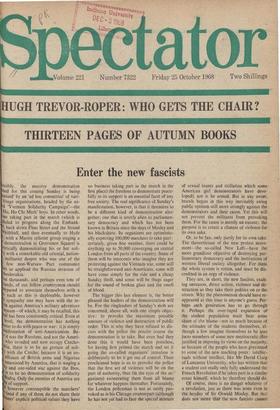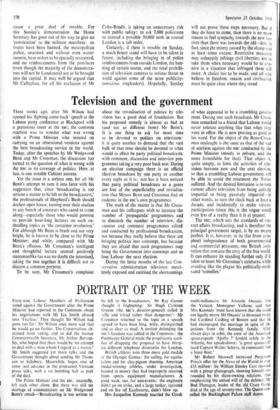Enter the new fascists
nsibly, the massive demonstration ned for this coming Sunday is being 4nised' by an 'ad hoc committee' of vari- fringe organisations, headed by the so- ea 'Vietnam Solidarity Campaign'—the Ho, Ho Chi Minh' boys. In other words, nhe taking part in the march (which is uled to progress along the Embank- 1, back down Fleet Street and the Strand W`hitehall, and then eventually to Hyde with a Maoist splinter group staging a demonstration in Grosvenor Square) is retically demonstrating his or her soli- IY with a remarkable old oriental, nation- militarist despot who was one of the few non-Warsaw Pact communist rs to applaud the Russian invasion of hoslovakia.
at thousands, and perhaps even tens of ands, of our fellow countrymen should pared to associate themselves with a such as this is deplorable, however sympathy one may have with the re- °n against America's military adventure Ietnam—of which, it may be recalled, this gal has been consistently critical. Even at level, the demonstration has nothing (ever to do with peace or war: it is simply anifestation of anti-Americanism. Be- it was the Russians, and not the Ameri- . Who invaded and now occupy Czech°. 4cia, there is to be no gesture of soli- With the Czechs: because it is an un- iance of British arms and Nigerian assisted by America, that is waging a and one-sided war against the Ibos, to be no demonstration of solidarity iafra. Only the enemies of America are Y of support. no business taking part in the march in the first place) the freedom to demonstrate peace- fully in its support is an essential facet of any free society. The real significance of Sunday's manifestation, however, is that it threatens to be a different kind of demonstration alto- gether: one that is utterly alien to parliamen- tary democracy and which has not been known in Britain since the days of Mosley and his blackshirts. Its organisers are optimistic- ally expecting 100,000 marchers to take part : certainly, given fine weather, there could be anything up to 50,000 converging on central London from all parts of the country. Some of them will be innocents who imagine they are protesting against the Vietnam war, some will be straightforward anti-Americans, some will have come simply for the ride and a cheap Sunday thrill, and some will be thugs eager for the sound of broken glass and the smell of blood.
The bigger this last element is, the better pleased the leaders of the demonstration will be. For the ringleaders of Sunday's mob are concerned, above all, with one simple objec- tive : to provoke the maximum possible amount of violence and destruction of public order. This is why they have refused to dis- cuss with the police the precise course the demonstration is to take. But even had they done this it would have been pointless, for having first primed the march and set it going the so-called organisers' intention is deliberately to let it get out of control. Their proclaimed hope is so to provoke the police that the first act of violence will be on the part of authority, thus (in the eyes of the or- ganisers) exonerating them from all blame for whatever happens thereafter. Fortunately, the London policeman is not as easily pro- voked as is his Chicago counterpart (although he has not yet had to face the special mixture Or, to be fair, only partly for its own sake. The theoreticians of the new protest move- ment—the so-called New Left—have the more grandiose objective of destroying par- liamentary democracy and the institutions of western liberal society altogether. For them the whole system is rotten, and must be dis- credited in an orgy of violence.
They are, in short, the new fascists, exalt- ing unreason, direct action, violence and de- struction as they take their politics on to the streets. Why the phenomenon should have re- appeared at this time is anyone's guess. Per- haps each generation has to go through it. Perhaps the over-rapid expansion of the student population must bear some share o- the blame—not so much because of the attitudes of the students themselves, al- though a few imagine themselves to be ipso facto members of some new meritocratic elite justified in imposing its views on the majority, as because of the people who have gravitated to some of the new teaching posts : intellec- tuals without intellect, like Mr David Craig of Lancaster University, who has written that a student can really only fully understand the French Revolution if he takes part in a similar event himself, which he therefore should do. cause a great deal of trouble, For this Sunday's demonstration the Home Secretary has gone out of his way to give no `provocation' to the militant marchers: no routes have been banned, the metropolitan police, unarmed and without even water- cannon, have orders to be specially restrained, and no reinforcements from the provinces (even though the majority of the demonstra- tors will not be Londoners) are to be brought into the capital. It may well be argued that Mr Callaghan, for all his exclusion of Mr Cohn-Bendit, is taking 'an unnecessary risk with public safety: to ask 7,000 policemen to control a possible 50,000 mob in central London is a tall order.
Certainly, if there is trouble on Sunday, a much firmer stand will have to be taken in future, including the bringing in of police reinforcements from outside London, the ban- ning of certain routes, and the total prohibi- tion of television cameras (a serious threat to wield against some of the more publicity- conscious ringleaders). Hopefully, Sunday will not prove these steps necessary. But if they do have to come, then there is no more reason to feel sympathy towards the new fas- cists than there was towards the old—less, in fact, since the misery caused by the slump was at least-some excuse. Restrictive measures may unhappily infringe civil liberties; not to take them when necessary would be to con- nive in a situation that infringed them still more. A choice has to be made, and all who believe in freedom, reason and civilisation must be quite clear where they stand.















































